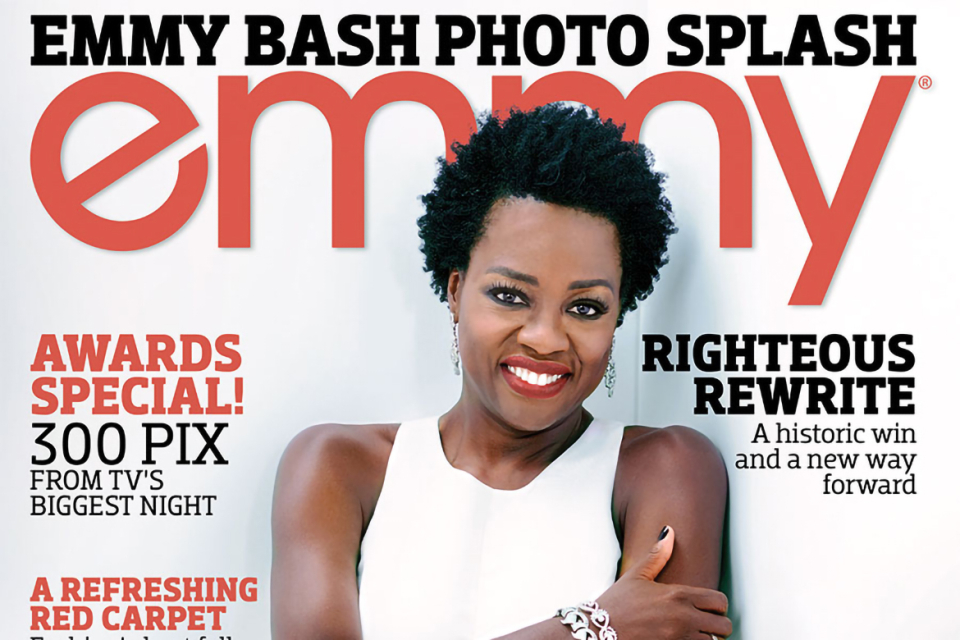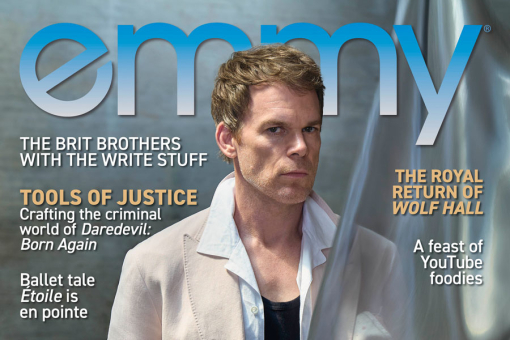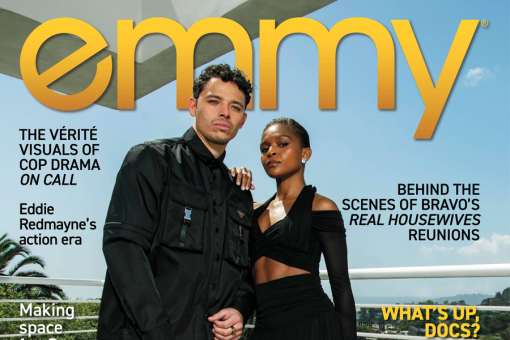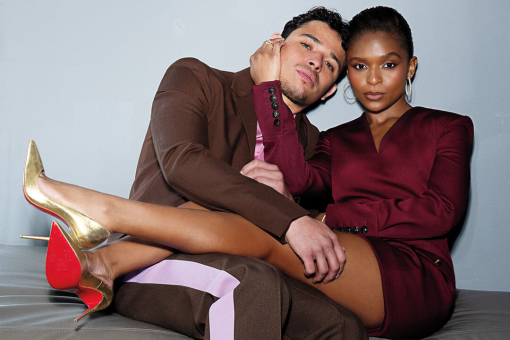It was a night of redemption and revelry, but mostly it was one for the record books.
On Sunday, September 20, during the live coast-to-coast Fox telecast from L.A.’s Microsoft Theater, Viola Davis was named outstanding lead actress in a drama for her performance in ABC’s How to Get Away with Murder. She is the first African American to win in that category in the 67 years of Emmy history.
“’In my mind, I see a line, and over that line I see green fields and lovely flowers and beautiful white women with their arms stretched out to me, over that line,’” recited a shaken Davis after accepting her golden statuette from Adrien Brody. “’But I can’t seem to get there no how. I can’t seem to get over that line.’ That was Harriet Tubman in the 1800s.
"And let me tell you something. The only thing that separates women of color from anyone else is opportunity. You cannot win an Emmy for roles that are simply not there.”
The actress then thanked the executives at ABC and all of the show’s writers and producers “who have redefined what it means to be beautiful, to be sexy, to be a leading woman, to be black.”
It was also a memorable night for HBO. The premium cable channel reasserted its dominance of the competition, earning the most Emmys of the evening (14 out of 26) and walking away with top prizes in comedy (Veep), drama (Game of Thrones) and limited series (Olive Kitteridge).
With its impressive standing a week earlier at the Creative Arts Emmys, the network ultimately received 43 statuettes in a wide range of disciplines, from acting (Peter Dinklage for Game of Thrones, Bill Murray and Richard Jenkins for Olive Kitteridge) to writing (David Benioff and D. B. Weiss for Game of Thrones, Jane Anderson for Kitteridge) and directing (Lisa Cholodenko for Kitteridge, David Nutter for Game of Thrones). At the Creative Arts Awards, it won statuettes for makeup, production design, editing, casting and special visual effects, among others (all for Game of Thrones).
Kitteridge triumphed in every category in which it was nominated, including a lead-actress Emmy for Frances McDormand. “My colleagues have already given the thank-yous that need to be said here,” McDormand said. “Because of the power of a story well told [it was based on Elizabeth Strout’s Pulitzer Prize–winning book], sometimes that’s enough.”
Rivaling Viola Davis’s win in a dramatic acting category was the lead actor win for Jon Hamm, who, after seven previous nominations in the category for his role as conflicted ad-man Don Draper in AMC’s Mad Men, finally walked away with the gold. Actually, he crawled up to the stage to receive his award as the audience stood in tribute.
“There must be a terrible mistake,” Hamm said. “It’s both incredible and impossible for me to be standing here.”
While many winners shed tears of joy and shared heartfelt remarks, perhaps the evening’s most memorable moment was the appearance of Tracy Morgan (30 Rock). Seriously injured in a traffic accident in 2014, the actor-producer — now considerably recovered — awarded the Emmy for outstanding drama series. “I miss you guys so much,” Morgan said to the audience. “Thanks to some amazing doctors and the support of my beautiful new wife, I’m here. But it’s been a long road back.”
Julia-Louis Dreyfus picked up her fourth and fifth Emmys for Veep, for lead actress and as an executive producer, when the show was named outstanding comedy. Overall the actress has seven Emmys to date, including acting awards for her previous series, The New Adventures of Old Christine and Seinfeld.
“I think it would be appropriate at this moment to quote our American politics show: ‘What a great honor it must be for you to honor me tonight.’ No, wait, I’m so sorry — Donald Trump said that,” the actress joked. “It’s getting trickier and trickier to satirize this stuff.”
Veep’s Tony Hale collected his second Emmy as a supporting actor and promptly thanked the show’s writers: “They make it possible to do what we do. And not only are these people so good at what they do, but they’re good people.”
The show also won a writing award, for Simon Blackwell, Armando Iannucci and Tony Roche.
The Daily Show with Jon Stewart, which saw the end of Stewart’s tenure as host this year, was named outstanding variety talk series. Additionally the series garnered awards for writing and directing, the latter going to Chuck O’Neil, who earned his first award after 12 nominations.
A bearded Stewart let his colleagues bask in the limelight before taking the microphone. “I’ve been off the air for six weeks, and this is the first applause I’ve heard in all that time,” he said. “It’s a barren wasteland out there. I will never have an experience like this [show] again.”
Amazon’s Transparent had its moments in the spotlight as creator–executive producer Jill Soloway received a directing Emmy. Among those she thanked was her “Moppa,” her own trans parent who was the inspiration for the show. “We don’t have a trans tipping point,” she said. “We have a trans civil rights problem,” noting that if her Moppa wanted to rent an apartment, laws in 32 states would not protect her from housing discrimination.
The star of Soloway’s show, Jeffrey Tambor, followed her win with one of his own, as lead actor in comedy. “I had a teacher who used to say that when you act, you have to act as if your life depends on it. Now I have the opportunity to act because other peoples’ lives depend on it. I dedicate my performance to the transgender community. Thank you for your patience, your courage, your inspiration and for letting us be part of the change.”
At the Creative Arts Emmys, Tambor’s colleague, Bradley Whitford, won an Emmy for his guest role on the show as a cross-dressing businessman.
At the start of the telecast Allison Janney was called to the stage, to accept the supporting-actress Emmy for her performance in CBS’s Mom; it marked her second consecutive win for playing a recovering alcoholic on the comedy and her seventh Emmy win to date.
“Lots of people are touched by addiction,” Janney said. She thanked the show’s co-creator–executive producer, Chuck Lorre, for “creating such a deeply flawed character and then for thinking of me to portray her. It’s a privilege to work on a show that reminds us there is hope — lots of hope.”
While Viola Davis made history with her win, she was one of three African-American women awarded acting prizes during the night: Uzo Aduba secured her second consecutive Emmy for her role as Suzanne “Crazy Eyes” Warren in Netflix’s Orange Is the New Black, and Regina King won a supporting-actress statuette for ABC’s limited series American Crime.
“I want to say thank-you a thousand times, and that may not be enough for you, Jenji Kohan [the show’s creator–executive producer], for putting belief back in my heart,” a tearful Aduba said. Since Orange was moved this year from comedy to drama, Aduba’s win puts her in a select group of actors who’ve won both comedy and drama Emmys for the same role.
When Inside Amy Schumer was named outstanding variety sketch show, the ecstatic writer-producer-comedian told the crowd, “We care so much about this show. I want to thank Jessi Klein, the head writer, who had a baby about ten seconds ago. I almost made a stupid sex-talk show that nobody wanted until she got drunk one night and told me that I had to follow my dreams and make my dream show.”
The reality competition category — which has gone to CBS’s The Amazing Race in 10 of the past 12 years — was upended when NBC’s The Voice prevailed. (The NBC show also won the category in 2013). “Sorry, Amazing Race,” a jubilant Mark Burnett, executive producer, said. “It’s our year this year.”
It was also the year of years for HBO’s Game of Thrones, a show that has often prevailed in technical and design categories but had not previously taken the top drama award.
“George Martin, happy birthday, sir,” executive producer David Benioff said to author George R.R. Martin, standing on stage with producing partner D.B. Weiss. “Thank you for inviting us all into your dream. To HBO, thank you for taking a chance on two schmucks with no experience.”
This year’s awards was hosted by Andy Samberg, star of Fox’s comedy Brooklyn Nine-Nine. He opened the show with a pre-taped number in which he sang about agreeing to watch every episode of every show prior to his hosting job — given the plethora of shows, that pledge entailed being locked in a bunker for one year.
“So many shows and so little time,” he lamented in song. “I’m just one man. How can I possibly keep up?”
A few critics just might agree.
For more Emmy news and to see hundreds of photos from the 67th Emmy awards, buy the latest issue on newsstands October 15 or click here.













